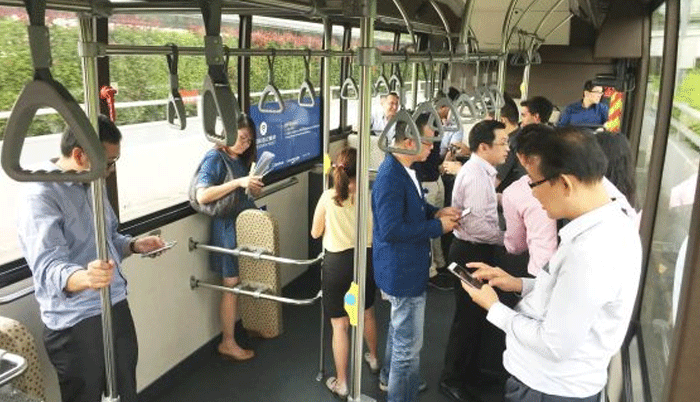![]() Home > Singapore
Home > Singapore
NUS Buses To Be Equipped With Wi-Fi In Trial With Starhub

Under the trial network, which is a first in Singapore, the hotspots are integrated into all 39 campus shuttle buses, as well as 15 access points around the campus comprising bus stops and buildings. Photo: NUS
![]() September 23rd, 2016 | 08:26 AM |
September 23rd, 2016 | 08:26 AM | ![]() 1159 views
1159 views
SINGAPORE
Telco to roll out the technology to other parts of Singapore if the one-year trial goes well
Students and staff of National University of Singapore (NUS) will be able access Wi-Fi while travelling on campus shuttle buses, in a trial with StarHub.
Called the connected vehicles pilot, the Wi-Fi points on these buses connect to other points in buildings on campus — extending overall coverage and more seamless connectivity on the ground.
If the one-year trial works well, StarHub will look into rolling it out elsewhere in Singapore. For instance, it would work well in high-density areas such as town areas, busy town centres and on buses.
The trial began three months ago. Overall, the Wi-Fi coverage — utilising a type of connected vehicle technology that has 10 times the range of normal Wi-Fi — will eventually cover about 60 per cent of the campus, said Professor Lawrence Wong, deputy director of Interactive and Digital Media Institute at NUS.
“It’s the ability to have a larger coverage of Wi-Fi infrastructure, and not just specifically indoors. Today, a lot of the Wi-Fi coverage is indoors, and rarely do we see coverage outdoors. With this, it means that we are able to bring Wi-Fi outdoors, on moving vehicles as well as off them,” added Mr Stephen Lee, head of StarHub i3 (Innovation, Investment, Incubation).
The connected vehicle technology is part of a “mesh network”. Such a network leverages vehicles as mobile Wi-Fi access points that connect to one another, and to fixed points in buildings, for a more stable connection and wider coverage.
Under the network — a first in Singapore — the hotspots are integrated into all 39 campus shuttle buses, as well as 15 access points around the campus comprising bus stops and buildings.
The eventual aim is to cover all 40 bus stops, said Prof Wong.
The findings from the pilot might form the plan for the rollout in other parts of Singapore, said Mr Lee.
Prof Wong said that this technology, which was originally built for vehicles, could be potentially built into autonomous ones, which are set to take off in Singapore and around the world.
“We’re talking about driverless vehicles in the future, they have to talk to each other. If they don’t talk to each other, there will be high risk of a lot of problems. So this technology also applies,” he said.
Currently, this vehicular mesh network has been rolled out commercially in Porto, Portugal, according to Veniam, the company which is providing the technology for the trial. The Porto network, introduced in 2014, involves 600 vehicles, including the entire bus fleet, taxis as well as municipal service vehicles.
Rolling this out across vehicles will also allow StarHub to analyse the anonymised data that is generated.
“We look forward to working with more commercial partners to expand the network to other parts of Singapore and find new ways to analyse and utilise the data collected in order to address various urban concerns and challenges facing the transportation and logistics industry,” said Mr Lee.
Source:
courtesy of TODAY
by TAN WEIZHEN
If you have any stories or news that you would like to share with the global online community, please feel free to share it with us by contacting us directly at [email protected]